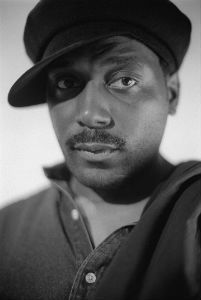Thomas E. Ricks's Blog, page 136
January 4, 2013
An Army general produces the most ambivalent review of my new book
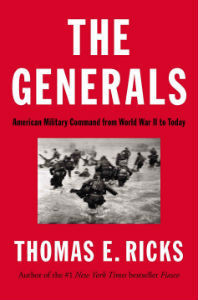
I've seen many
positive reviews of my
book, and a few
negative ones. But
I have not seen one so entirely ambivalent as the one by retired Army Brig.
Gen. John Brown in ARMY magazine. On the one hand, the general thinks my
new book is
"engaging, well-written, sensibly documented, and interestingly organized." He
adds: "People are going to read and enjoy this book."
On the other hand, there is actually quite a lot
General Brown dislikes about my book. Most of all, he really, really hates my
emphasis in the book that the Army should fire ineffective generals, and even
announce such actions. "Much the same was said about public flogging in its
day," he comments. I guess that makes George Marshall a public flogger.
At this point in the review, the GPA (the Generals'
Protective Assocation) kicks in. "We need not apologize for being protective of
our colleagues and their reputations," he admonishes. Hmm. I would say, Oh yes you do, if by doing so you have
protected failures and incompetents at the expense of the troops and the nation.
That would be at least unprofessional, and perhaps a dereliction of duty.
General Brown also takes sharp exception to my
description of the 1991 Gulf War, in which he fought. "I had been under the
illusion that accomplishing all assigned missions with a minimum of casualties
while liberating a friendly country and driving out a powerful adversary was a
success -- but what do I know?" I would respond, It is not what you knew then, it
is what you have learned in the last 22 years. What we do know now is that
Saddam Hussein believed he had won that war, because he emerged from it as the
sole Arab leader to take on the United States and its allies militarily and
survive. (See page 386 of my book for quotes from his cabinet meetings about
this.) Plus, the 1991 war never really ended -- we fought in Iraq for another two
decades. Bottom line: If your foe thinks
he won, and the fighting doesn't end, then I don't think you've won your war.
Rather, I think you may have won your first battle and then ended the conflict
prematurely.
General Brown also thinks the way I write about
Generals Franks, Sanchez and Casey is "presumptuous." I thought I was just
using plain English. Trying to say clearly what one really thinks is harder
than it looks.
Oddly, Brown disregards the account at the
beginning of my book about how I came to write it. He suspects I had "a
portfolio of favorite stories" I wanted to tell. Rather, as I explained in a
section beginning on page 7 of the book, I was puzzled by how the same U.S.
Army that was so quick to relieve during World War II was so slow to relieve in
Iraq, and it made me wonder if lack of relief is liked to lack of
accountability -- and most importantly, if lack of accountability leads to lack of
adaptivness
He also seems to have skipped my long section on
the post-Vietnam rebuilding of the Army, saying that in my account, "American
generalship involved in successes off the battlefield since World War II don't
seem to matter."
Yet. Yet for all that, he emerges surprisingly
enthusastic about the book. It ends, he says, "with some pretty respectable
recommendations." His surprising conclusion: "The Generals will raise your blood pressure and expand your mind. I
recommend it."
In
related news, the Army War College library put The Generals on its new suggested reading list.
Rebecca’s War Dog of the Week: Sgt. Rex, one of the first dogs to serve in Iraq, dies

By Rebecca Frankel
Best Defense Chief Canine Correspondent
Just three days before Christmas, a note bearing sad tidings
came up on a Facebook feed:
Military working dog Rex (E168) passed away this
morning. He was 11 years old (April 2001-December 2012). Rest in peace Rex and
thank you for your service and sacrifice. Once a Marine, Always a
Marine...Semper Fi
Former Marine dog handler Mike Dowling posted the notice. Rex
had been Dowling's dog in 2004 and, when they deployed to Iraq that year, they
were one of the first U.S. dog teams to go into a combat zone since Vietnam.
Rex's story is one we've followed
closely here -- from his stint with Dowling in Iraq (a harrowing story well told in
Dowling's 2011 book),
to his heroic tour in Iraq during which he was gravely injured, and finally
the dog's highly publicized and star-studded
transition from working dog to housedog. When Rex became eligible to retire
from service last year, he was adopted by Marine handler Megan
Leavey, who served with the dog in Iraq.
In his book, Sgt. Rex,
Dowling writes how it was his bond to Rex that sustained him during their
starkly dangerous tour; one in which their role was mostly undefined and ever
evolving. A particularly moving passage in light of the dog's recent death:
I keep thinking that a time will
come when Rex is gonna flee from the next explosion with his tail between his
legs. Or I'm gonna come to my senses and realize that I just can't do another
lonely, death-defying walk ... But here's the thing: Having Rex beside me helps
give me the strength so I can face
it. ... Never once has he faltered when I've asked him to do the walk with me,
not even when we're under the enemy's gun. And because of this, he's put steel
in my soul."
Complications with Rex's health arose suddenly during the
night of Dec. 21st and Leavey, who rushed him to the emergency vet, also posted
a note on Facebook letting friends and fans know that Rex did not suffer long
and when it became clear he could not be treated comfortably, she was confident
euthanasia was the right decision. He went peacefully the following morning.
Leavey writes
she was grateful she got to spend the last eight months with her "partner and
best friend." During the time Rex lived with her, "he got to roam the yard & bark at deer, play
with as many toys as he wanted all day everyday, sleep in a cozy bed next to me
every night, chase and eventually make friends with my 2 cats, enjoy & play
in his first snowfall."
RIP: MWD Spike, a dog reportedly stationed at the Marine Corps
Recruit Depot in Sand Diego and also 11 years old, passed away on Jan. 1.
Rebecca
Frankel, on leave from her FP
desk, is currently writing a book about military working dogs,
to be published by Atria Books in September 2013.
January 3, 2013
Quote of the day: Moving through Army jobs too fast with too little accountability

Maj.
Scott
Stagner took this lesson away from his time in
2006 commanding a 7th Special Forces Group detachment in
southern Afghanistan: "We
are so rushed as officers to get through and check blocks. In my opinion,
everyone is looking more toward their next job than they are at their current
job. I fault our system for that ... We rush people through because we are stuck
on this system of trying to get everyone through all the jobs that we can
possibly get them exposed to. So, 1) they are never held accountable for truly
their actions. You have to really mess up to get relieved and it does not happen
very often. And 2) you don't ever get to operate in the job that you are
training for. You are always getting trained to move on to the next position,
so rather than employing the best person for that job. The best person is the
guy that gets pulled out immediately to go and do something else."
Congratulations to Sir Hew Strachan

The Oxford historian and strategist was knighted the other day. But of course you
expected that after Foreign Policy
listed him recently as one of the 100 most influential global thinkers.
I just don't
understand why Sir Mix-a-Lot was honored first.
Veterans on trial: The coming court battles over PTSD — and the costs of war
By Barry Schaller
Best Defense office of combat-related
litigation
I wrote Veterans on
Trial to provide an unflinching
view of how combat-related PTSD evolved and to assess its current and future
impact on American society and, in particular, on the court system. I sought to
serve another major purpose as well -- to set the stage for a hard look at
future policy considerations for U.S. military interventions.
The idea for the
book arose while I was participating in a multi-disciplinary bioethics working
group on the ramifications of PTSD. The widespread incidence of PTSD in the
Iraq and Afghanistan wars convinced me that this was a critically important
project. The title refers to the trials and tribulations that veterans must
undergo, not only in court, but in their daily lives as they negotiate the
transition to civilian life. I refer also to the fact that PTSD will continue
to be a source of controversy, not just within the psychiatric profession, but
in serious criminal cases in which the stakes are the highest and as a human
cost factor in future political and military decision making concerning war.
I begin by focusing
on the management of psychiatric casualties by military leaders and
psychiatrists during American wars from the Civil War forward. I begin by
stripping away the confusion -- and obfuscation -- that have prevented a clear
understanding of the origin and role of combat-related traumatic stress in
war-time. Although PTSD has become widely known in popular culture, I believe
that the public's understanding is superficial. The public has only a
rudimentary idea of what PTSD is, how it arises in military service, how it
affects mental and physical health, and why it is not taken into account in
decision making about war. This is so, largely, because so much of what is said
about it by the military, as well as by mental health professionals, is overly simplistic,
incomplete, and inaccurate.
PTSD finally gained
official recognition in the Diagnostic and Statistical Manual (DSM) of the
American Psychiatric Association during the post-war cultural upheaval
following Vietnam. That came about, not because the Vietnam War produced more
PTSD, but because of the post-war cultural turmoil. The social-political
alliance supporting veterans would not let go of the issue. PTSD and its
predecessor conditions have arisen in each war because of a constellation of old
and new factors configured in unique ways. I learned that, paradoxically, all
wars are different but, in a sense, all wars are the same.
I examine critically
how the disorder has been a moving target, undergoing transformation in the
various DSM editions. I also argue that it is far more complex and variable
than the experts claim. I explain in detail how PTSD has been used when
veterans were on trial in criminal court after Vietnam and, more recently,
during and after deployment to Iraq and Afghanistan.
I bring the
narrative to its logical application -- an analysis of the key problems facing
military and political leaders today. The most critical problems that have been
inadequately dealt with, in my view, are military sexual trauma (MST) and the
escalating military suicide rate. I find particularly blameworthy the chronic
failure of political and military leaders to consider -- before deploying
military force -- the human cost of war. They are equally culpable for their
lack of accountability for the consequences of the interventions. One measure
is to provide a seamless transition from military to VA care.
I am also convinced
that, despite the growing role of women in the military, the military has
utterly failed to take obvious steps to bring about the cultural change needed
to eliminate widespread sexual assault and harassment. The high rate of suicide
among active duty soldiers and veterans is a clear signal of dysfunction within
military culture. Although I recognize that the leadership has instituted some
typical measures in an effort to stem the tide, the military has failed to take
the most obvious step to uproot the causes - a painstaking examination of the
root causes within its own culture.
It is obvious to me
that political leaders must shoulder responsibility for failing to take into
account the human cost of war before making decisions to use force. If all
costs, including human as well as economic, social, and foreign policy, were
taken into account fully, war would become what it should be - a last resort
for critical situations to be used only after every possible diplomatic
measure.
I confront other
controversial subjects, including the widespread creation of veterans treatment
courts and the claim that returning veterans are bringing violence into
American society. As for the former, I believe that diversion programs for
veterans should be available to other defendants based on an equal justice
standard. Establishing special courts for any category of citizens, even
deserving veterans, is misguided because it is inconsistent with our system of
justice and it lets the responsible institutions -- the executive and
legislative branches - off the hook by cleaning up the problems that they
created.
As for societal
violence, contrary to familiar claims made after nearly every war, veterans
have not been proven to cause a spill-over of violence in civilian society.
While isolated episodes do occur, it is painfully true, as shown by recent
events, that American society has a long history of episodic violence.
Americans suffer from a national amnesia about the violence in civilian
society, just as we do about our reliance on force in our foreign policy. For
so young a nation, we have a well-developed national mythology to explain away the policies and practices that we do
not care to acknowledge.
I cannot urge too
strongly that we -- political leaders and citizens alike -- forego our usual
post-war practice of evading a hard look at the mistakes, misjudgments, and
lessons of war. Unless we undertake a painstakingly critical examination of
these long wars, we are destined to repeat the past - and we will suffer the
consequences.
Barry R. Schaller retired from the
Connecticut Supreme Court in 2008, but continues his judicial service on
the Connecticut Appellate Court. He also is a Clinical Visiting Lecturer at the Yale Law
School and the author of
Veterans
on Trial: The Coming Court Battles Over PTSD
, published in 2012 by Potomac Books.
January 2, 2013
‘None of Us Were Like This Before’: Why hasn’t the U.S. military done a better job of addressing torture by our soldiers?
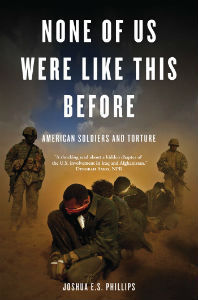
That was the question that kept on coming back to me as I
read Joshua Phillips' None of Us Were Like
This Before. It is not a perfect book but it is an
important one.
Yes, there are ethical and moral reasons for conducting a
comprehensive review of instances of torture of Iraqis, Afghans and others by
American soldiers over the last 10 years.
But there also are practical reasons:
1. The damage torture does to those who inflict it. (Two of the
soldiers in the unit Phillips examines killed themselves after coming home.)
2. The damage torture does to our war efforts-both in the host
populations, and in world opinion.
3. The effect on the current force.
The questions I would like to see addressed include:
--Who tortured?
--Why?
--Who stopped torture?
--What were the characteristics of units that indulged in
torture? And of those that didn't?
--How can we better train soldiers to deal with this?
--Are there continuing effects on the force that need to be
addressed?
One final note: Phillips writes that, "I rarely met a
detainee who had received an apology, or any acknowledgement at all, for the
harsh treatment he had endured during U.S. captivity."
‘XLDB’?: Tom don’t want no Big Data
Beer call report: High time to reward good performers and get rid of the big failures

By Michael
Haft and Harrison Suarez
Best Defense personnel symposium leaders
At last Friday's beer
call we had a turnout of eight people. It was an
intimate group of truly concerned people, and the meetup went very
well. The only consensus was that the current system isn't working, but
the discussion helped the two of us refine our thinking. As usual, it left us
with more questions than answers.
Here are our
notes:
We've produced an
organizational culture of risk-aversion and conformity, as well as a "stay
in your box, just do your time" mentality. This is a
tactical/operational reflection of a strategic leadership problem.
The causes put forth
were all related to incentives: short deployments, high rates of turnover,
inability to fire people for poor performance (you can only fire for ethical
transgressions), and a habit of sending non-performers away on training
teams to Iraq/Afghanistan, even while we preach partnering as the main
effort.
As relates to personnel
policy, we discussed it in the context of the RAND study which talked about
DOPMA essentially unionizing the military. The group agreed that it's had the
effect of driving many top performers away. Worse, for the ones who do stick
around, the military is limited in its ability to reward them with faster
promotions or movement to more prestigious/influential billets.
A common trend is that
all of this stuff is happening at such a high level, and yet it's having a
dramatic impact on the lowest ranks (not just officers-it doesn't take long for
enlisted Marines to know which of their leaders is good and bad).
So who's to
blame?
Should we blame the
high-performer who decides to walk away? He could keep serving, but how long
can you be frustrated and under-appreciated before you go look for something
better?
Should we blame bad
leadership? That's an easy answer, but most of the bad leadership is just a
response to incentives. "That's just the way the game is played" has
more power than we acknowledge.
Should we blame the
Marine Corps? It operates within the law, Anbar and Helmand are arguably the
biggest success stories from the two wars, it's maintained expeditionary units
across the globe the entire time, and oh by the way it stood up a new branch
for Special Operations Command. It's certainly done its part.
Should we blame the
Congress? They aren't familiar with the personnel policy-most of them haven't
served. And who puts them there in the first place?
So should we blame the
American people for electing the Congress? For choosing not to serve in the
all-volunteer force? How can we? The message they got was to go shopping
and that the wars would be quick and easy.
What we decided was
that we all share in the blame. No one person or group can take responsibility
for everything that's going wrong. Instead, at every level, this is a
response to incentives.
So how do you change
the incentives? We can debate specific fixes for hours. But most simply, you
have to take care of your top performers and you have to get rid of those who
aren't up to the task. That's not pleasant when someone has served
honorably for a decade and has a family, but who does the military exist to
serve?
PS:
We'd like to give a shout-out to Schlafly Pumpkin Ale.
Michael Haft and
Harrison Suarez are two former infantry officers in the United States Marine
Corps. The views presented here are their own and do not represent the Marine
Corps or the Department of Defense. Yet one feels there is a good chance that
Jay-Z
is down with them.
December 31, 2012
An admiral’s surprising reading list
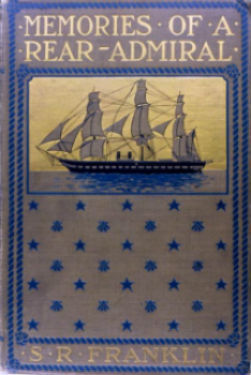
By
Rear Adm. John Kirby
Chief of Naval Information
Here are 15 books that have made an enormous impact on me,
personally and professionally. Indeed, I can honestly say that each of these
has affected not only the way I do my job, but the way I think about the way I do my job.
These are books I have read and re-read several times and
often give as gifts.
It's not an all-inclusive list by any stretch. I love to read
lots of different stuff. There are no works of fiction on it, for example, and
there are no works of naval history -- both of which I enjoy immensely. I
chose, rather, specific books that have helped me make sense of the world
around me and shaped the ways in which I try to communicate for the
institution.
I claim no particular expertise in public relations. I've
never received any formal education in the field. These books, then, have
largely served as my reference library for a career built through "on-the-job"
training. I hope you enjoy them as much as I have.
1. On Writing Well, by William Zinsser
This is THE definitive book on how to write powerfully and
clearly, everything from memoirs and travel pieces to science and technology
articles. Right in the opening pages -- on page five in fact -- he talks about
the unspoken transaction between a writer and his readers: "Good writing has an
aliveness that keeps the reader reading from paragraph to the next, and it's
not a question of gimmicks to ‘personalize.' It's a question of using the
English language in a way that will achieve the greatest clarity and strength."
If you want to write with clarity and strength -- and we should ALL want to do
that -- this is the book you need to read. Then pick it up a few months later
and read it again.
2. Brave Men, by Ernie Pyle
War is messy and ugly, cruel and destructive. But it is also
a STORY, a story of drama and skill and pain and suffering. It is tragedy and
comedy all rolled into one, the exclamation point at the end of the human
sentence. Nobody -- and I mean NOBODY -- tells that story better or more simply
than Ernie Pyle did. Brave Men, first published in 1943, is a collection
of his syndicated columns from the time he landed with our troops at Sicily
until the liberation of Paris. He writes about World War II from the
perspective of the troops, from the average Joe. There isn't a lot of strategy
in this book, but there is an awful lot of heart.
3. Generating Buy In: Mastering the Language of Leadership, by Mark S. Walton
Adm. Mullen made me read this book before we left Naples to
come back to DC. We both found it enormously helpful as he prepared to be CNO.
It's not a big book, but it's full of big ideas about how to communicate
effectively. I still consult it frequently. It's a MUST read. And don't let the
title fool you. This is not some boring, new-age business book. It's about telling good stories and about
being persuasive.
One of the chief lessons author Mark Walton -- a former CNN
producer -- tries to impart conveys is the power of THREE. People typically don't
remember more than three things at a time. That goes for messages, too.
When you make a pitch, deliver a speech, or write a PA plan, keep it to three
points and make them as personal as possible. Take the audience on a journey
with you and you'll get "buy in."
4. The Eloquent President, by Ronald White
We all know that Lincoln was a powerful speaker, but what
many people don't realize is just how hard he had to work to develop that skill
and just how vital he considered it.
Examining a different speech, address, or public letter in each
chapter, White explains the evolution of Lincoln's rhetoric from the lawyerly
tones of the First Inaugural to the "immortal poetry" of the Gettysburg
Address. He shows how hard Lincoln worked to be good at communicating. This is
one of the best books I've read in the last five years, and it only reinforced
for me the enduring power of the spoken word -- the speech --and the art form
that is speechwriting.
5. The Savage Wars of Peace, by Max Boot
America has never really been an isolationist power. That's
the premise of Max Boot's book. But just as critically, he says, we're pretty
good at fighting "small wars."
We've had lots of practice, as Boot points out, basically
staying "involved in other countries' internal affairs since at least
1805." And, let me tell you, THIS is a Navy-Marine Corps story: the
Barbary Wars, Panama, Samoa, the Philippines, the Boxer Rebellion, Haiti, the
Dominican Republic, Nicaragua, Beirut, Grenada. The list goes on. We were
there.
You may take issue with Boot's conclusions about how and why
such wars are fought, but his views deserve a hearing -- especially when we
still have tens of thousands of troops fighting such wars in Afghanistan,
Africa and elsewhere, even while we stay ready for the large ones which may yet
loom.
6. Let the Sea Make A Noise, by Walter
McDougall
OK, this is a doorstop-sized book. Let me just get that out
there right now. But it is well worth the time it will take you to read it.
McDougall tells the twisted and sometimes sordid international history of the
North Pacific since about the 16th century.
He does this masterfully and, as one reviewer says, "with a
special emphasis on the intertwined histories of the Americans, Russians and
Japanese." But he also tells the story by dreaming up seminars hosted by
ghosts: Father Junipero Serra, a Spanish missionary; Kaahumanu, consort of
Hawaiian King Kamehameha; William Seward, Lincoln's secretary of state; Count
Sergey Witte, prime minister to Russia's Nicholas II; and Saito Hirosi,
Japanese ambassador to the United States. The ghosts argue with him and with
each other, as they debate the relevant issues and try to derive lessons for us
today.
Diving into this book will prove useful for any Navy leader
as we begin to focus more of our attention and intellectual capital on the
Asia-Pacific region. It's a beast, but also a good refresher.
7. Other Men's Flowers, by Field Marshal Lord Wavell
I have become a big believer in the power of poetry. Poetry
is not written for the eye. It's written for the ear, for the heart. It has
rhythm and meter and symmetry -- the very things one needs to be a good
communicator. It pulls you in even as it makes you smarter.
This is my favorite collection of poems, selected by Field
Marshal Lord Wavell, a veteran of both World Wars and a scholarly man. Here is
Kipling and Sir Walter Raleigh and Ralph Waldo Emerson. Here is Browning and
Asquith and G. K. Chesterton. Wavell collected these works for himself, to give
him sustenance and comfort. "I have a great belief in the inspiration of poetry
towards courage and vision," he said. "And we all want all the courage and
wisdom at out command in days of crisis when our future prosperity and
greatness hang in the balance."
8. Journalism Next, by Mark Briggs
I'm an old guy, which means I have very little imagination
anymore. What I like about this little book is that it forces me to think about
"what's next" in the field of journalism. I know enough to know that if I can't
understand that, I'm dead in this business. I can't afford to stop learning.
Briggs does a great job laying it all out in simple, clear
language -- complete with lots of graphs and pictures so the history major in
me can get it. You'll learn the future of micro-blogging, how to edit digital audio
and how to make news "participatory." It's a textbook of sorts for digital
journalists, but PAOs and MCs can benefit a lot by reading it.
9. Counselor, by Ted Sorensen
I didn't like everything
about this book, to be honest. At times I thought Sorensen was being way too
self-serving. But then I needed to remind myself that virtually ALL
autobiographies are self-serving. And it's a long read too, coming in at a
whopping 896 pages.
But there is no denying that Sorensen was to John F. Kennedy
what all good staff officers should be to their principals -- a MOST effective
advisor. He didn't just write JFK's speeches (which were fantastic no matter
what you think of Kennedy's politics); he advised the President on nearly all
matters of state -- from the Cuban Missile Crisis to the decision to go to the
moon.
Sorensen had plenty of chalk on his cleats. They were covered
in it. We should strive for the same.
10. Profiles In Courage, by John F. Kennedy
Speaking of President Kennedy, I have always enjoyed
re-reading this Pulitzer Prize winner of his. Artfully written, it tells the
stories of eight U.S. Senators who defied constituent and/or party loyalties on
conscience alone. He writes, for instance, of John Quincy Adams' break with the
Federalist Party, Sam Houston speaking out against the Kansas-Nebraska Act of
1854, and Nebraska Senator George Norris, who opposed the arming of U.S.
merchant ships as a violation of our neutrality in the early days of World War
I.
All of these men suffered politically -- and sometimes
personally -- for taking these stands, but they took them anyway. They had
moral courage. This isn't a book about being right. It's a book about doing the
right thing. And it's a classic.
11. Freedom at Midnight, by Larry Collins and Dominique Lapierre
It wasn't until I read this book that I felt like I truly
understood the turmoil we continue to see in South and Central Asia.
Ostensibly, this is a book about the partition of India, which took place at
midnight on 15 August 1947. And it tells that story exceptionally well. The
book reads like a novel. Indeed, the movie Gandhi
was based on it.
But it really takes the reader inside the psychology of the
four men most responsible for dividing up the British Raj into modern-day
India and Pakistan: Lord Mountbatten, Mahatma Gandhi, Jawaharlal Nehru
and Muhammad Ali Jinnah. It also reveals the utter brutality of
that partition. It's a tragic story, but a critical one to understand if you
want to understand why we still struggle with extremism in that part
of the world.
12. Stride Toward Freedom, by Dr. Martin Luther King, Jr.
I am ashamed to admit that I didn't read this book until only
a few years ago. It ought to be mandatory reading for every high-schooler. Not
only was Dr. King a brilliant writer, he was also a good storyteller. And in
this small but powerful work, he tells the story of the Montgomery Bus boycott
-- the beginning of the civil rights movement.
Why does it matter? Because that was a seminal moment in
American history -- the moment when we finally started to grapple with just who
really were the "WE" in "We the people." It traces the journey of an entire
community, dedicated not just to each other but to a better future for their
children, and shows how a young man with passion and natural leadership ability
helped transform a nation.
We cannot function as good advisors if we ourselves cannot
understand other perspectives. And I don't believe you can begin to understand
other perspectives until you feel them. Dr. King made me feel them.
13. The Life of Reilly, by Rick Reilly
I was never much of a sports fan as a kid. I played a lot of
sports, but I didn't follow them much. The details of sports coverage just didn't
interest me. Then, in college, I took a part-time job as a sports clerk with
the St. Petersburg Times. I got to
know a bunch of sportswriters and came to appreciate how difficult their job
really is. Sure, it's fun to cover sports, but making it interesting and fun
for readers is a whole different matter. That takes talent.
There is no more talented sportswriter than Rick Reilly. His
column graced the back page of Sports
Illustrated for nearly 23 years. Even my wife, no lover of sports, loved to
read HIS stuff. She would often get to the magazine before I could and go
straight to the back page. When he left Sports Illustrated in 2007, we canceled
the subscription.
This book is a collection of his best columns up to about
2003. Some are funny, some are sad, some are poignant. But all of them make you
think, and all of them are crisp.
It's like he's talking to you. You don't READ Rick Reilly, so
much as HEAR him. That's good writing.
14. Following the Equator, by Mark Twain
Twain has always been my favorite author. I love his humor,
his wit and the ease and simplicity of his writing. Following the Equator captures his essence best, in my
view. It's a travel log of a trip he
took around the world in 1897.
For Twain, the book was an attempt to make some badly needed
money, but for his readers -- then and now -- it serves as a window into the
world, a window we can still look through. He tackles racism and strip-mining
and military adventurism. He lays bare the prejudices and the vices with which
many foreign governments administered their colonies. And he does it all with
the precision of a scalpel, making you think even as you laugh out loud.
Twain ends the work with this line: "Human pride is not
worthwhile; there is always something lying in wait to take the wind out of
it." A good lesson for us all.
15. Public Opinion, by Walter Lippman
Lippman was sort of the Tom Friedman of his day -- a columnist,
a thinker, a provocateur. He wrote about pretty much everything: politics,
social issues, the economy. He published this book in 1922 as a fundamental
treatise on the nature of human information and communication. It is still very
relevant today.
Divided into eight parts, the work covers such varied issues
as stereotypes, image making, and organized intelligence. Though dense in
places -- with examples that can be difficult for modern readers to follow --
Lippman lays out the cultural and psychological factors that affect the way
people think about events.
"The analyst of public opinion," he writes, "must begin by
recognizing the triangular relationship between the scene of action, the human
picture of that scene, and the human response to that picture working itself
out upon the scene." You don't have to look any further than today's headlines
to see how true this phenomenon remains. We would do well to remember that it
isn't just "what happens" that affects public opinion. It's what
people THINK and FEEL about what happens. It's about the imagery those events
call to mind.
The Navy’s new reading list
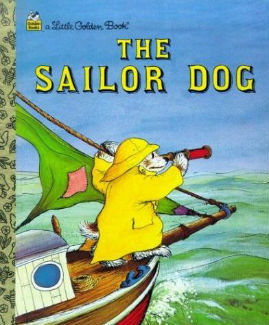
You
can have personal reading lists and professional reading lists. Here is the
Navy's official compilation. It is quite different
from Admiral Kirby's, but both are useful and interesting. Explanations and
additional info here.
1812: The Navy's War
Cyber War: The Next
Threat to National Security
SEAL of Honor
Wake of the Wahoo
Shield and Sword
The Gamble
Monsoon
Crisis of Islam
Neptune's Inferno:
The U.S. Navy at Guadalcanal
Red Star Over the
Pacific
Execute Against Japan
The Man from Pakistan
Time Management from
the Inside Out
The Morality of War
In the Shadow of
Greatness
Wired for War
A Sailor's History of
the U.S. Navy
Navigating the Seven
Seas
Thomas E. Ricks's Blog
- Thomas E. Ricks's profile
- 436 followers


